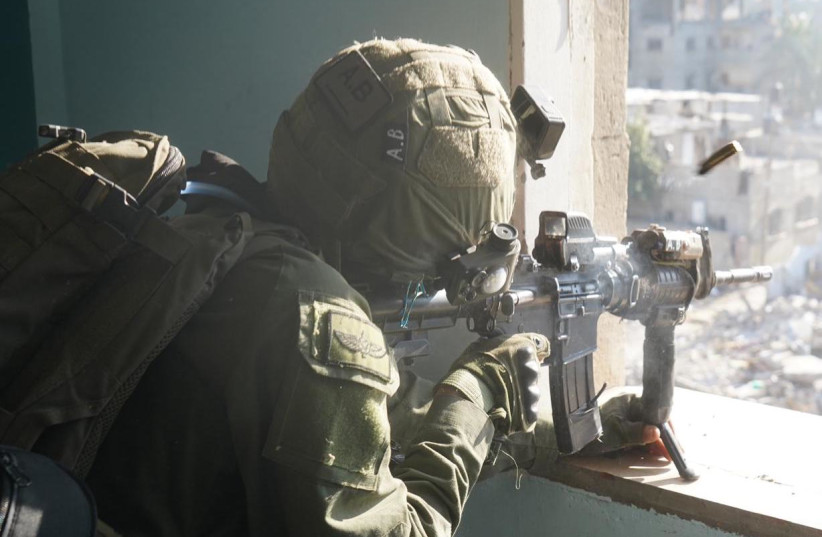Yair Ansbacher, a military expert and consultant, provided his insights regarding Israel's warfare tactics, stressing that this is, counter to some opinions, a war over Israel's very right to exist.
"There is a very distorted, yet popular Israeli opinion at present, which holds that since we were 'screwed over,' and seeing as we were caught off guard by a strategically well planned attack by Hamas, despite all the prior warnings we had, that this means that we must continue to be 'screwed over.' What people do not understand by taking this stance is what's really at stake: the future of all Israeli civilians," Ansbacher said at the beginning of his interview with Maariv in late January.
"What this war is really about is the very existence of the Israeli people both in the State of Israel and abroad," he explained. The war Israel is currently waging involves several dimensions, he added. First and foremost, "the human, emotional dimension, which collides with Hamas's approach. Hamas knows how sensitive we are to other human life.
"The second dimension which we should be aware of and understand is a strategic, rational one. Through it, we must realize that Hamas has essentially taken all of Israel hostage. In fact, what campaigners like Ronen Tzur and his colleagues did was to raise this issue from a tactical, military level, to a strategic, geo-political level – an event that is of the utmost importance to the fate of the country and of the entire war."
"In the first ceasefire," he added, "Hamas succeeded in halting Israel's momentum. We transitioned to a different type of fighting in the northern Gaza Strip – to urban, guerrilla warfare. This compensated Hamas for Israel's own, sudden surprise attack against it when Israel entered the Gaza Strip."

"The way in which Hamas is fighting, and its use of the underground tunnels, these tactics are all meant to achieve one goal – to force Israel to maneuver. Given that time is not in the country's favor, the more time it takes Israel to maneuver, the more the country's legitimacy to defend itself begins to be challenged worldwide. International condemnation will intensify, so Hamas hopes, to the point where Israel is sanctioned – this is what Hamas is counting on, this is what it hopes will bring about our eventual failure. Because with sanctions, we will be unable to achieve the main war objective, which is the destruction of Hamas," he explained.
"This gives our local and global enemies the legitimacy to continue pushing for our complete destruction, somewhat like sharks act when they smell blood," he continued. "Dealing with the issue of Gaza and with that of the hostages is critical. This is a strategic, existential battle, not just an incident, though unfortunately, significant parts of the security establishment still refer to it as such, which is a strategic mistake like no other."
Qatar mediating with Hamas is like Eichmann mediating with Hitler
Regarding recent negotiations, he said: "To conduct negotiations during the war through Qatari mediation is like making a deal with Adolf Hitler through Adolf Eichmann's mediation. Qatar is the one who built, mediated, funded, and gave ideological support to Hamas – who are among the worst of our enemies. Therefore, any deal is bad from the outset. We also give Hamas a lot of credit and respect as a partner to make deals with.
"Hamas will certainly demand that it be given time to locate kidnapped individuals," he warned. "In their audacity, they already requested that Israel not monitor them with its drones. Significantly, a deal that includes the release of murderers and terrorists is a bad one, as we learned all too well from the Gilad Schalit deal. Their approach is disconnected, detached, and insane. They consider a deal a victory for themselves."
"I interviewed a Hamas Nukhba terrorist on October 8, and I asked him: 'What now?' He casually replied: 'We will get a deal.' I replied, 'Do you really think so? Look around you, look at the level of the damage done, Israel will never agree to such a thing.' But he persisted: 'Of course Israel will.'"
At the end of the interview, Ansbacher expressed his opinion on how Israel should respond to the Israeli hostages held in Gaza: "Only through determined operational activity, including special operations that Israel is too fearful of carrying out at the moment due to political concerns, in fear that it would be accused of failure. Apply as much maneuvering in warfare as possible, exert pressure on Qatar and bring it back to the center of attention as well. It is fine to consider targeting Qatar – after all, this is an enemy state."
"It is terrible that we find ourselves in a status where Qatar has earned some kind of immunity. The issue of putting pressure on Palestinian prisoners is also a sensitive one. We do nothing in this regard, but they could, and should be used as leverage," he concluded.
